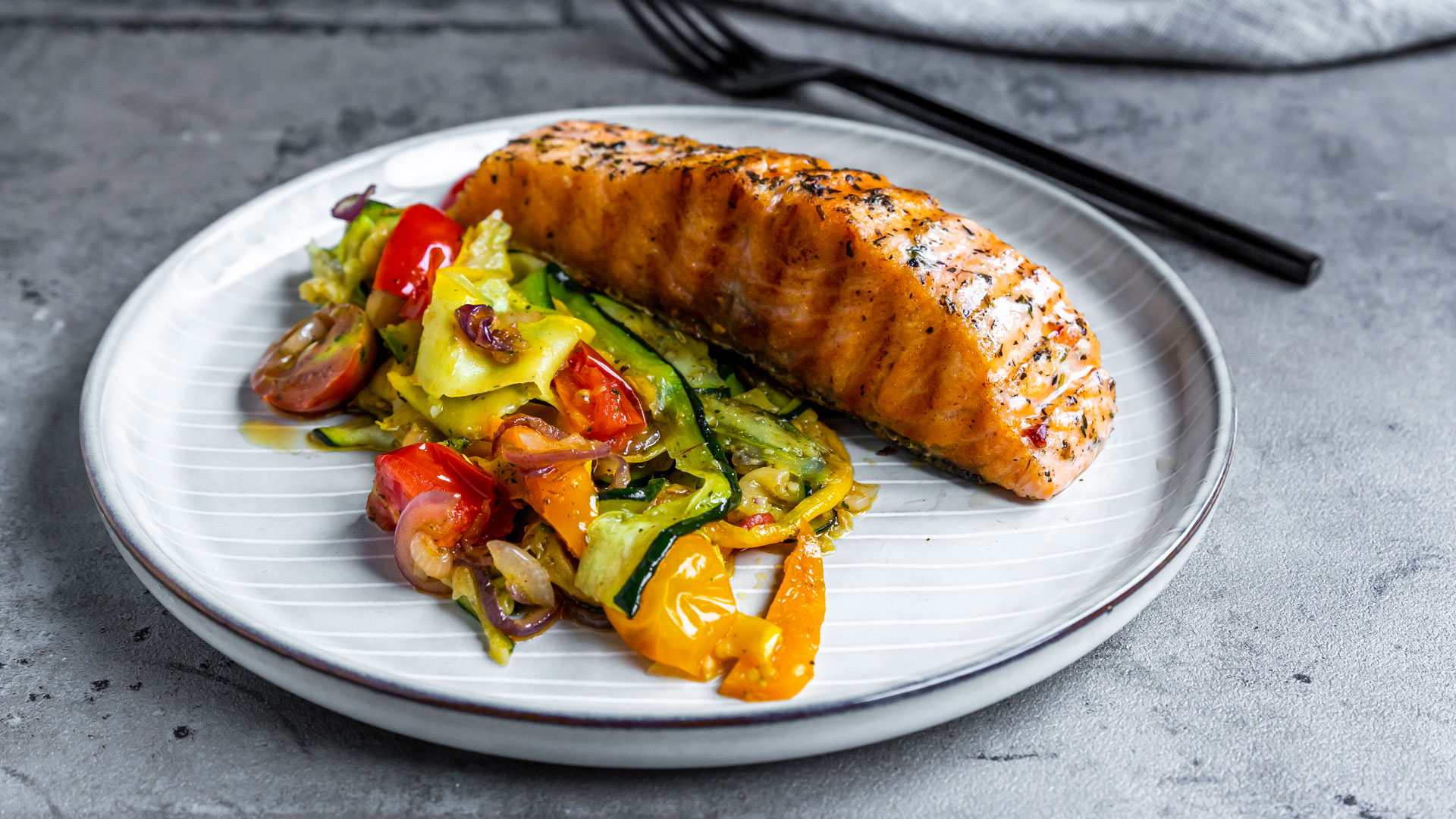Mediterranean diet for weight loss
We look at the mediterranean diet for weight loss, and whether it can improve your long term health

The Mediterranean diet for weight loss has long been praised as the epitome of good health, but what exactly is it? Well, the diet focuses on eating fresh, unprocessed foods that are high in fiber and protein, which makes the diet filling and lower in overall calories than the average American diet.
Combined with an active lifestyle, you can use the Mediterranean diet to support your weight loss goals and you may even find that you experience other benefits of eating this way. The Mediterranean diet is low in saturated fat, refined sugars, and salt and high in cardioprotective foods such as fruit, vegetables, and oily fish. By adopting some of the principles of the Mediterranean diet into your daily eating, you may be able to reduce your risk of developing conditions such as heart disease and obesity.
If you want a roundup of our favorite exercise machines to support your journey on the Mediterranean diet for weight loss, have a look at our buying guide to the best exercise machines to lose weight.

What is the Mediterranean diet?
The Mediterranean diet is popular with doctors and dieticians alike as it is low in saturated fat, sugar, and heavily processed foods, which adheres closely to the healthy living guidelines laid out by the USDA.
Paola Langella, Italian nutritionist and founder of Shapes Studio, tells us more about the ins and outs of the diet. “The Mediterranean diet has already been proven to be one of the healthiest diets in the world as it includes vegetables and fruit at the center of every meal, plus fresh fish rich in Omega 3, and extra virgin olive oil,” she says. “If you go to any restaurant in Southern Italy, you can enjoy a delicious fresh pasta or risotto with fish and vegetables and you will be sure that the only dressing on the plate is extra virgin olive oil and salt.”
A 2020 study in Nutrients journal also indicates that the Mediterranean diet can contribute to effective weight loss. Diets high in lean protein and high fiber foods are filling, which can help maintain a healthy weight as we can enjoy a sense of satiety.
Sophie Medlin, a Doctify-reviewed consultant dietitian, and director of CityDietitians said; “Generally, the Mediterranean diet is based on foods which are popular in Mediterranean countries,” she says. “This includes things like vegetables, nuts, legumes, fish, grains, and oils. It also encompasses a lower intake of red meat, processed food, and refined sugar. The Mediterranean diet encourages the use of olive oil and also allows for small amounts of red wine. As a lifestyle, the Mediterranean diet also encourages community and connection with other people and plenty of physical activity.”
Get the Fit&Well Newsletter
Start your week with achievable workout ideas, health tips and wellbeing advice in your inbox.
Can you use the Mediterranean diet for weight loss?

Although the Mediterranean diet discourages eating many foods that can cause weight gain and health conditions such as obesity, if you are consuming more calories than your body is using, you will not see a drop in the number on the scale. Medlin tells us: “Whilst the Mediterranean diet is known for its health benefits, there's no way to guarantee that it will aid in weight loss. The positive is that it's a very balanced way of eating and unrestrictive, meaning it's likely to be easier to maintain over time.”
It is also worth noting that the Mediterranean diet is filling and satisfying, which can make it easier for you to adhere to a calorie deficit. A study in the Annual Review of Nutrition journal indicated that in adults aged 55-75, the diet was particularly effective in reducing abdominal fat, particularly in younger participants with high BMIs.
Langella tells us that the Mediterranean diet is a mindset as much as a pattern of eating. “When you follow a Mediterranean diet, you satisfy your appetite not only because of the rich content of minerals, vitamins, and healthy fats, but also on a deeper level: in your heart,” she says. “When you see your plate is full of beautiful colorful vegetables and tasty fish, rice, or pasta, your attitude towards eating and enjoying your meal changes completely and it stops you reaching for something sweet. If you do have a sweet tooth, dessert is homemade without processed sugar or additives.”
What are the benefits of the Mediterranean diet?
The Mediterranean diet is lower in saturated fat than the average American diet, and a review in the American Journal of Medicine suggests that it can reduce the risk of developing cardiovascular diseases. Additionally, a 2015 study in the Annual Review of Nutrition indicated that high consumption of vegetables, fruits, nuts and legumes can positively impact cardiometabolic risk.
“Following a Mediterranean diet may lower the risk of cardiovascular disease, type 2 diabetes, and high cholesterol,” says Medlin. “It also may play a role in lifespan; people who closely follow a Mediterranean diet are likely to live longer. There is also an indication that the diet may prevent cognitive decline, though more research is needed to confirm this.”

Another study in Nutrients journal indicated that the Mediterranean diet can help to decrease the risk of developing some cancers, due to the amount of anti-inflammatory and antioxidant (carotenoids and lycopene) rich foods eaten as part of the diet.
What foods can’t you eat on the Mediterranean diet?
Langella explains that processed foods are off the table when following the Mediterranean diet for weight loss. “This includes processed meats, frozen meals that contain a lot of sodium, refined grains, alcohol (other than good quality wine), butter and processed or hydrogenated oils,” she says.
If you decide to follow the Mediterranean diet strictly, you will probably want to cut out the majority of processed foods and red meats. Replacing your steak with a fish dish or legume-based protein source can help you to cut out unnecessary saturated fat, and swapping your processed grains for wholewheat alternatives is a great way to boost your fiber intake.
“The diet is generally low in red meat, added sugars, refined grains, and highly processed foods,” Medlin adds.

Lou Mudge is a Health Writer at Future Plc, working across Fit&Well and Coach. She previously worked for Live Science, and regularly writes for Space.com and Pet's Radar. Based in Bath, UK, she has a passion for food, nutrition and health and is eager to demystify diet culture in order to make health and fitness accessible to everybody.
Multiple diagnoses in her early twenties sparked an interest in the gut-brain axis and the impact that diet and exercise can have on both physical and mental health. She was put on the FODMAP elimination diet during this time and learned to adapt recipes to fit these parameters, while retaining core flavors and textures, and now enjoys cooking for gut health.
-
 Build blockbuster arms and abs with Chris Hemsworth's go-to dumbbell circuit
Build blockbuster arms and abs with Chris Hemsworth's go-to dumbbell circuitAll you need are adjustable dumbbells and 20 minutes
By Sam Rider Published
-
 Forget crunches—if I wanted to improve core strength I'd do this neck-friendly Pilates workout
Forget crunches—if I wanted to improve core strength I'd do this neck-friendly Pilates workoutAnd it takes just five minutes
By Maddy Biddulph Published